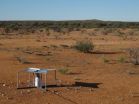(Press-News.org) Medical researchers have found a missing link that explains the interaction between brain state and the neural triggers responsible for learning, potentially opening up new ways of boosting cognitive function in the face of diseases such as Alzheimer's as well as enhancing memory in healthy people.
Much is known about the neural processes that occur during learning but until now it has not been clear why it occurs during certain brain states but not others. Now researchers from the University of Bristol have been able to study, in isolation, the specific neurotransmitter which enhances learning and memory.
Acetylcholine is released in the brain during learning and is critical for the acquisition of new memories. Its role is to facilitate the activity of NMDA receptors, proteins that control the strength of connections between nerve cells in the brain.
Currently, the only effective treatment for the symptoms of cognitive impairment seen in diseases such as Alzheimer's is through the use of drugs that boost the amount of acetylcholine release and thereby enhance cognitive function.
Describing their findings in the journal Neuron, researchers from Bristol's School of Physiology and Pharmacology have shown that acetylcholine facilitates NMDA receptors by inhibiting the activity of other proteins called SK channels whose normal role is to restrict the activity of NMDA receptors.
This discovery of a role for SK channels provides new insight into the mechanisms underlying learning and memory. SK channels normally act as a barrier to NMDA receptor function, inhibiting changes in the strength of connections between nerve cells and therefore restricting the brain's ability to encode memories. Findings from this latest research show that the SK channel barrier can be removed by the release of acetylcholine in the brain in order to enhance our ability to learn and remember information.
Lead researcher Dr Jack Mellor, from the University of Bristol's Medical School, said: "These findings are not going to revolutionise the treatment of Alzheimer's disease or other forms of cognitive impairment overnight. However, national and international funding bodies have recently made research into aging and dementia a top priority so we expect many more advances in our understanding of the mechanisms underlying learning and memory in both health and disease."
The team studied the effects of drugs that target acetylcholine receptors and SK channels on the strength of connections between nerve cells in animal brain tissue. They found that changes in connection strength were facilitated by the presence of drugs that activate acetylcholine receptors or block SK channels revealing the link between the two proteins.
Dr Mellor added: "From a therapeutic point of view, this study suggests that certain drugs that act on specific acetylcholine receptors may be highly attractive as potential treatments for cognitive disorders. Currently, the only effective treatments for patients with Alzheimer's disease are drugs that boost the effectiveness of naturally released acetylcholine. We have shown that mimicking the effect of acetylcholine at specific receptors facilitates changes in the strength of connections between nerve cells. This could potentially be beneficial for patients suffering from Alzheimer's disease or schizophrenia."
INFORMATION:
The research team involved the University of Bristol's MRC Centre for Synaptic Plasticity and the Division of Neuroscience in the School of Physiology & Pharmacology, part of the Bristol Neuroscience network. This work was supported by the Wellcome Trust, MRC, BBSRC and GSK.
Paper:
Facilitation of Long-Term Potentiation by Muscarinic M1 Receptors is mediated by inhibition of SK channels, by Buchanan KA, Petrovic MM, Chamberlain SEL, Marrion NV & Mellor JR in Neuron.
Notes to Editors:
Bristol Neuroscience: Neuroscience is one of the key areas of research at the University of Bristol. The city of Bristol has one of the largest concentrations of researchers engaged in neuroscience in the UK, many of whom are internationally recognised. In 2003 Bristol Neuroscience (BN) was established to enable all neuroscientists working in Bristol – both within the University and its partner hospitals across the city – to make full use of all available resources and expertise. BN runs numerous activities to encourage the dissemination of ideas, to create opportunities for interdisciplinary research, and to facilitate the pursuit of neuroscience to the highest possible standard. For further information on BN see www.bris.ac.uk/neuroscience or contact Dr Anne Cooke, b-n@bristol.ac.uk.
Issued by the University of Bristol, Public Relations Office, tel 0117 331 8092.
Contact: Aliya Mughal, tel 0117 331 7033 / 07879 430 139, Aliya.Mughal@bristol.ac.uk
Scientists discover brain's inherent ability to focus learning
2010-12-09
ELSE PRESS RELEASES FROM THIS DATE:
A swarm of ancient stars
2010-12-09
The globular cluster Messier 107, also known as NGC 6171, is a compact and ancient family of stars that lies about 21 000 light-years away. Messier 107 is a bustling metropolis: thousands of stars in globular clusters like this one are concentrated into a space that is only about twenty times the distance between our Sun and its nearest stellar neighbour, Alpha Centauri, across. A significant number of these stars have already evolved into red giants, one of the last stages of a star's life, and have a yellowish colour in this image.
Globular clusters are among the oldest ...
Low and high vitamin D levels in older women associated with increased likelihood of frailty
2010-12-09
Chevy Chase, MD—A recent study accepted for publication in The Endocrine Society's Journal of Clinical Endocrinology & Metabolism (JCEM) found that lower and higher vitamin D levels were associated with an increased likelihood of frailty in older women. Women with vitamin D levels between 20.0 and 29.9 ng/ml were at the lowest risk of frailty.
Vitamin D deficiency and frailty are common with aging. Dimensions of frailty, including weakness and slowness are potential outcomes of vitamin D deficiency and many experts have recommended measuring vitamin D levels in older ...
New test shows promise for accurate early diagnosis of Turner syndrome
2010-12-09
Chevy Chase, MD—A recent study accepted for publication in The Endocrine Society's Journal of Clinical Endocrinology & Metabolism (JCEM) has demonstrated a novel and accurate test for early diagnosis of Turner syndrome. Turner syndrome affects one in 1,500 to 2,000 female live births and early diagnosis allows for the timely management of short stature and co-morbid conditions including cardiac and renal problems.
Turner syndrome (TS) is the most common genetic problem affecting girls with short stature. Average adult height in untreated girls with TS is 4 feet, 8 inches, ...
Weightlifting does not appear to increase risk of arm swelling for breast cancer survivors
2010-12-09
A slowly progressive weight lifting program for breast cancer survivors did not increase their risk of lymphedema (arm swelling and discomfort), according to a study that will appear in the December 22/29 issue of JAMA. The study is being released early online to coincide with its presentation at the San Antonio Breast Cancer Symposium.
Lymphedema is a frequent complication among breast cancer survivors and ranks high among their concerns, as it may impair arm function and quality of life. "Breast cancer survivors at risk for lymphedema alter activity, limit, activity, ...
Weightlifting slashes lymphedema risk after breast cancer treatment
2010-12-09
(SAN ANTONIO) -- Weightlifting may play a key role in the prevention of the painful limb-swelling condition lymphedema following breast cancer treatment, according to new research from the University of Pennsylvania School of Medicine. Combined with the team's previous findings that the exercise limits a worsening of symptoms among women who already have lymphedema, the new data cements the reversal of long-running advice that breast cancer survivors should avoid lifting anything heavier than five pounds after they finish treatment. The research results will be presented ...
Astronomers detect first carbon-rich exoplanet
2010-12-09
CAMBRIDGE, Mass. -- A team led by a former postdoctoral researcher in MIT's Department of Earth, Atmospheric and Planetary Sciences and the MIT Kavli Institute for Astrophysics, recently measured the first-ever planetary atmosphere that is substantially enriched in carbon. The researchers found that the carbon-to-oxygen ratio of WASP-12b, an exoplanet about 1.4 times the mass of Jupiter and located about 1,200 light years away, is greater than one. As they report in a paper to be published on Dec. 8 in Nature, this carbon-rich atmosphere supports the possibility that rocky ...
ASU astronomer opens new window into early universe
2010-12-09
Thirteen billion years ago our universe was dark. There were neither stars nor galaxies; there was only hydrogen gas left over after the Big Bang. Eventually that mysterious time came to an end as the first stars ignited and their radiation transformed the nearby gas atoms into ions. This phase of the universe's history is called the Epoch of Reionization (EoR), and it is intimately linked to many fundamental questions in cosmology. But looking back so far in time presents numerous observational challenges. Arizona State University's Judd Bowman and Alan Rogers of Massachusetts ...
Euthymics presents phase II data for EB-1010 in major depression at ACNP annual meeting
2010-12-09
Euthymics Bioscience, Inc. today will present Phase II clinical data demonstrating that its lead product candidate EB-1010, a next-generation antidepressant, is effective for treating major depressive disorder (MDD) based on multiple standard measures of outcome for depression. EB-1010 also improved measures of anhedonia, a hallmark symptom of MDD, which is characterized by the inability to experience pleasure. The data further demonstrate that EB-1010 is well tolerated, without the weight gain or sexual dysfunction associated with the most common pharmacological treatments ...
Scientists map what factors influence the news agenda
2010-12-09
Computer scientists have analysed over a million news articles in 22 languages to pinpoint what factors, such as the Eurovision song contest, influence and shape the news agenda in 27 EU countries. This is the first large-scale content-analysis of cross-linguistic text using artificial intelligence techniques.
Every day hundreds of news outlets across Europe choose which story to cover from a wide and diverse selection. While each outlet may be making these choices based on individual criteria, clear patterns emerge when all these choices are studied over a large set ...
The double-edged sword of dominance
2010-12-09
A study of chimpanzees has revealed that dominant animals with higher testosterone levels tend to suffer from an increased burden of parasites. Researchers writing in BioMed Central's open access journal BioPsychoSocial Medicine observed the primates' behavior and studied their droppings to draw the link between dominance and infection status.
Michael Muehlenbein from Indiana University and David Watts from Yale University, USA, carried out the study in 22 male animals at Kibale National Park, Uganda. According to Muehlenbein, "Acquisition and maintenance of high dominance ...


